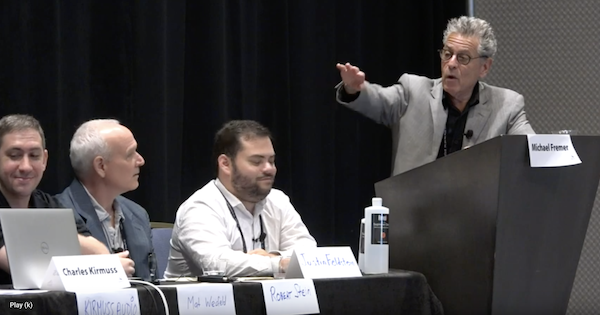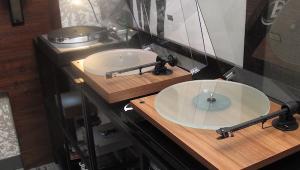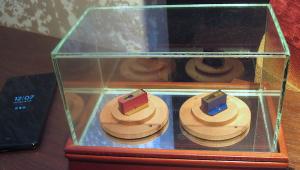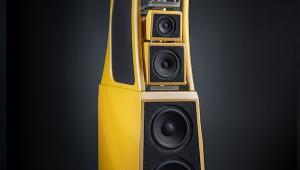I would have liked the panel to address the sonic differences between different cleaning methods.
Record Cleaning Made Difficult Panel at RMAF 2019

- Log in or register to post comments


Great idea for a panel.
Uh, oh...I am a heretic: This "wait 20-24 hours before playing a record again" is utter and total BS.

Interesting watching, thank you.
Having just purchased Tergikleen via Amazon I was concerned by Charles K's comment about Tergitol, reiterated by Justin F.
Looking at Tergikleen's ingredients and dilution recommendations it would appear that the Ethylene Oxide content of the applied fluid is in the order of 0.008% - is this really as harmful as suggested? Or are they talking about higher concentrations (EO content stated as less than 3% and this is then diluted in the ratio of 1ml in one gallon of water).

I know Kurmiss is interesting, but I almost wouldn’t buy one of his machines for the amount of time he monopolized from the rest of the panel. A guy like that will run roughshod over the others if you let him. Michael, you need to let others get a word in edgewise occasionally. The othe guys all represented good systems that I heard almost nothing about because Kurmiss wouldn’t shut up.

I know what you mean, but he did seem more prepared than most of the others and willing to discuss the art and science and his "research"as opposed to just product.
And his kit does really does an exceptionally good job.
What I do get fustrated with tho' are his claims, especially of ill, which really need more debate/challenge/evidence.
Also in the debate was KC saying his machine does a 2 minute cycle - I dont recall seeing this in the KA documentation - and then there was a claim about doing 4 records at once - maybe if you have aload of 7 and 10" records - unless you have a specail modified version.
I also thought the different comments on the cleaning fluids "illuminating". I am sure some old H&S colleagues would be rightly horrified by the story about drinking of VPI cleaning fluid - is this the only fluid that can be claimed as tested on humans??? Note some fluids don't cross borders - eg TM8 is not exported.

Kudos to him for enthusiasm and accessible pricing!
I just don't have the time/inclination. I love my Audio Desk. (Sometimes, I will Nitty gritty and then Audio desk a disc!)
I also fall short in that once I have cleaned a record, I'm not schmutzing it up again as far as I know, so from there I proceed with only my Ursa Major carbon fiber brush for subsequent play.(I have no fiscal connection, I just LOVE the Ursa Major. Very much worth your time!)
If you close your eyes when listening to him, you'd guess Kirmiss was Dan Aykroyd! Then, imagine him saying, "I'm on a mission from God."
_
Drift: I've been looking at stylus geometries, anybody know just how far down into the groove the newest styli are going?

Yes, Mr. Kirmuss is also passionate about vinyl records and is very well intentioned too, even though at times he seems a bit over the top. He purposely set out to make cavitation record cleaning safe and accessible to more folks. His ingenious cleaning transport system also really sets him apart. He has done us commoners proud.

The word ester is pronounced ES-TER, not easter. One is a holiday, the other is an organic chemistry term. Polymerization is correct, palmerization, is not correct. I agree with you when you say he's his own worst enemy. It's hard to get behind Kirmuss as an expert when he mispronounces these basic terms. Thanks for doing what you do

And I KNEW that dude wouldn't shut up!
HAHAHAHAHAAHAH..
And Mikey's captions from the pictures in Stereophile a few months back were HILARIOUS.

This person " jeffhenning" is exactly the type of thing that has infested the Hoffman online forums. They are generally people with poor hearing and/or systems and have become these know-it-all, know-nothings that take out their inferiority complexes on actual audiophiles. They often judge audio factors in terms of "this can't be" and "this is how it should be" and are unable to hear what the rest of us are hearing.

I posted this same comment on the Kirmuss thread on Steve Hoffman Forums: my main concerns are the long term consequences of the chemicals Kirmuss uses to clean records. When a substance is being created/catalyzed on the surface of the vinyl, that bothers me. What's the reaction that is causing this and what are its long term effects on my LPs? Will they still be undamaged and playable in 50 years? Will they be too brittle to play? Et cetera. Mr. Fremer's extremely positive review and the low price of the machine and system are definite draws, but ....

If I recall, Mr Kirmuss suggests spraying a light mist of the surfactant on the record and spreading it with the brush after cleaning. (That is one area I don't agree with personally. I am of the belief that the only thing that should touch a cleaned record is a carbon fiber brush or similar for dusting and the stylus for playing).

My concern is that something necessary (like plasticizers) is being leached from the vinyl itself. I'm not a chemist, but none of the cleaning processes, chemicals, etc. that I've used over 40 years in this hobby has ever left a DIFFERENT substance on the surface of the record. What is the white stuff? Is it all dirt, mold-release compound, etc.? It has to come from somewhere. Some sort of reaction is causing this residue to appear or is creating it. Is it from the dirt/surface contaminants or is it from the vinyl?

It's a little bit of all that and also dependent somewhat on how vigorous you with the brush. The propol/distilled water surfactant the Kirmuss system uses is similar in reaction to brushing as anything containing alcohol. I was able to get some "white stuff" to show on a perfectly clean record by vigorously using the brush as opposed to just less vigorous brushing.
Nothing to worry about here, it doesn't leave residue or harm the record due to several factors. Two of them being:
1) it contains extremely little propol of which the PH balance is fairly neutral to records, plasticizers, etc.
2) It is not on the record long enough to do anything to it. It is simply used as a way of lowering the tension of the water so it gets into the grooves during cavitation.

I know there was an oblique discussion of L'Art du Son cleaner, which does have both adherents and detractors. Michael, I'm curious what your particular concerns were regarding its suitability. I'm using an Okki Nokki, which I keep scrupulously clean otherwise. I use a fairly good dousing of LADS, pushed in with a goat's hair brush, vacuumed up and followed by a pass with just distilled water (and its own brush). This seems to get a lot of gunk out. I contacted LADS (also distributor for Loricraft) in Germany and the owner, Martina Schoener and she recommended the 2nd rinse pass with distilled water.
Here's what their manual says about the particles:
Storage life
In our experience the concentrate lasts up to five years if it is kept cool and dark after opening it. Older flasks may wear an expiration date which is meant as a rough point of reference. White particles can occur and are no indication of decay. They dissolve into smaller particles after shaking the flask.
We know that there are some misunderstandings regarding the visible particles:
Please notice that the chemicals forming those visible particles in the flask are functional to the important chemical properties of the cleaning and antistatic process itself. As they are lipophilic they are visible in a water based concentrate. In a mixed solution grey fingernail-shaped particles however indicate the decomposition of the cleaning concentrate. It is still effective but at a lower degree and it will be ineffective soon. The grey color is a sign of bioactive organisms like Aureobasidium pullulans (an airborne fungus) and other common microorganisms that start to biodegrade the ingredients. It is totally random if the mixed solution ever gets in contact with any organisms that start to live in the solution container one uses for storage. Both concentrate and solution decompose faster in plastic containers than in tinted glass.
Michael, just curious on your thoughts on this.

1/ Thanks, that was an interesting discussion..except for
2/ That VPI dude was so annoying with his constant mugging. Rocky Mountain's own John Krasinski. Seriously, if you don't want to be there or offer something, then don't be there.
3/ Kirmus is a dork but he's on to something and at least he's passionate about what he does. VPI guy could take a page or 2 from him.

Yeah, Mr. Kirmuss (Charles as he insists on with some of us) can be a bit over the top, but he is passionate about records and very well intentioned! He has really dialed in record cavitation cleaning and has the best transport for said cleaning as well and all at a price one can afford even if needing to save up. (A lot quicker to get to $800 than it is to $5k).
I have not watched the video yet, but will when I get home.

Sometimes we unintentionally show things. Mat, you had a rightful place on the panel. I think your RCMs speak for themselves! I have had a 16.5 for 6 years and still going strong. I use it with AVIS fluids for initial treatment before cavitation if needed. Take care of them and they are built like brick chicken houses. Real workhorse.

Is great to see your contribution... I REALLY like your TURNTABLES The Prime Signature Rosewood is on my wish list... Just need to go out and rob a Bank!....Hmmm.. where did I put my Ski Mask? lol (no offence)

Having freezer ice packs at the ready when you are using the KA cleaner - brilliant suggestion! Why didn’t I think of it. (Don’t answer that)
One of my records went floppy-floppy due to the water temperature, even though I had switched the cleaner off after every 7 5minute sessions.

Yes, genius way to cool things down quickly! Wish I had thought of it. Make sure the packs are very clean though.On the flip side as well, after 30 minutes of cleaning records, a 20 minute break is usually well warranted, but i like the ice pack idea to make sure things are cooled down while you wait.

Recently in an email exchange with Kirmuss he recommended switching to 2 minute cycles for LPs loaded with that white paste. I swear I heard him say in this video or the other RMAF video that after 3 minutes the surfactant is no longer effective. If that's the case, why bother with 5 minute cycles?

Hi,
Just found an answer on the Kirmuss Web Site Q&A's. And it is linked to water sheeting or beading of water on records after the second 5 min cycle.
If I have read it correctly, amongst others, expect to see this on new Mo-FI and AP pressings. And i guess it therfore applies to other RTI and QRP pressings. So this may mean that those AP records I have thought clean aren't.
Not sure I get this sheeting bit.
And I'm f****d if I can see where this 2 minute clean come from unless CK means cleaning a record again after it has already been cleaned by a KA-RC1.
Gosh it is is complicated.

https://www.nme.com/news/music/vinyl-set-outsell-cds-first-time-since-19...
LP may surpass CD for sales volume in 2019!
Blu Ray music disc sales didn't show up in the data...below cassette and 8-track?
Anybody know how many Blu Ray music discs sold this year? I'm worried it's defunct.

It's par for the course to have trolls make uninformed comments.
It is, however, quite unexpected to see the host of this venerable site resort to name calling and insults.
I am quite disappointed.

Nobody and I mean nobody likes to be ignored. That is far and away the best course of action. In my old age I have become very tolerant thanks to Current Occupant, so like water rolls off a duck's back (or the slick polymer coating on the hood of my SUV), these trolls are simply unable to penetrate my consciousness. I don't even make it to the end of their first post. If nobody says a word to him or any troll then he will disappear. They can feed only on attention, pure and simple. Much like a mass shooter knows he will get his fifteen minutes of fame while everyone is rightfully so distraught by his behavior. No more media time to embolden others. This analogy is a bit of a stretch but is true and it also will work. I loved your Kirmuss review in Stereophile with the surprise ending of sorts. I'll keep my VPI-17F but would love to live among a group of audiophiles that purchased one where I could borrow the Kirmuss machine for a few choice recordings, like Tommy! (and side 5 of NGDB Will the Circle Be Unbroken that starts with the incomparable Doc Watson singing Tennessee Stud). Great musicians, banter, and sound!

time for my complaint.. His pic has got to go for sure its a pic of a child's private parts.. Male to be specific.. Seriously? he's a sicko

While I truly enjoy Michael destroying this oaf, I am wondering.. if what he is posting (in his profile pic) is considered criminal? Hmmmm....
I'll leave it someone else to give him back the Karmic Slap In the Face this frigginbagadouch deserves!
So DeafHenning... keep it up.. We're building a case for your demise!

...for getting rid of static electricity. Put the album on the turntable. Take a AAA battery and hold the plus side against the album's lead out for a couple seconds, not on the paper label of course. Don't scratch! Next put away the battery and turn on the turntable, take a cotton cloth and wipe clean the record. Or use the typical carbon brush. Can't explain the science behind this, but for me it makes huge difference.

First I enjoyed the discussion however I agree Mr. Kirmuss needed to be muzzled so the others could speak.
Second, I had the Kirmuss system and found it not to be as advertised, he also has contradicted himself numerous times when it seems to benefit his theory. I am sure it may work for those who have the dedication and time to commit but when I purchased mine there was nothing in any of the literature which referred to a 2 minute cleaning cycle.
I have since moved on to an Audio Desk Vinyl Pro and a Nessie Vinylmaster. Michael I know you looked at this machine and hope you do a full review on it soon. I use both. the Nessie more as a day to day cleaner and the Audio Desk for full cleanings.

my fluid of choice, for my VPI 16.5, is Champagne.

The new Degrittor is a very nice unit at little more than one half the cost of the ADS. I've had mine for a few months and have beet very, very satisfied. Washing and drying cycles are adjustable for duration, frequency is 120KHz so no annoying buzzing, nothing touches the playing surface and the manufacturer supplies their own cleaning solution additive but you can use something else or just plain water if you'd like. The unit is well made and compact. The manufacturer is very responsive as well.
https://degritter.com


Just watched the entire thing, thanks. I have been Kirmussed and must recover.
Maybe people concoct their own fluids because even the experts disagree so much? Just a thought. I’ve lately been using L’Art Du Son and have had no problems with it, plus the NG FirsTV for new records before it. Is that the best way? Who knows? As far as I’m concerned, any cleaning is much better than none at all.

Hi Mike,
Long-time reader, first-time poster.
I was wondering what your thoughts are on the surfactant used in the KA-RC1 cleaning process? Do you always see "soap" when cleaning your vinyl? Does anyone know what that white stuff is?
I already own a Nitty Gritty and a Loricraft. do you think drying records on the Loricraft after using the KA-RC1 is a good idea?
Thanks for all you do for us vinyl lovers! :)

Paul Rigby did an article on his website for the KA-RC1 - He went as far as to recommend making your own surfactant consiting of Propylene Glycol supplied in food industry so if you have household pets, they are not in danger of consuming the Kurmuss suplied surfactant consiting of nasty Ethylene glycol. (harmful if swallowed)
I actually own this machine with help of Michaels video and other research. My answer to your question about seeing soap every time you use the surfactant - "NO" not all records exhibit a soapy substance depending how clean it is. I've had some records show none or very little, the repeated cleaning process reduces the soap evidence. same as you see in his videos. Eventually, there is no longer signs of soap and then you proceed to give the record its final bath.
The Negative: "time consuming process"
Pros: Great End Result
As per the panel at the RMAF - I Thought Charles did well, as he was the most prepared to prove that he believes that his method is superior to other methods that exist. He is definitely out to prove a point and is criticized as per one may say... his evangelistic / scientific detailed approach.
Well done Michael on the presentation as it was good to see a panel that did offer similar and indifferent opinions on this most interesting topic. Bravo!

Thank you Mike for always helping the Vinyl community, of the panel your are the only one not profiting from this forum. They all should be grateful and to happily participate in convincing and teaching (the purchasing customer) how and why their product works compared to their competitors. Being prepared and respectful (of the competition) is the first rule of sales 1 O 1 (young or old). If you are passionate about your product let us know (don't sulk and wave to your child like it's pre-school) we invested over an hour of our time watching this video to learn. We (I) want to know why I should buy your product, if someone is monopolizing the discussion open your mouth and tell us your products features and benefits and why it works, sitting there saying nothing or arguing over statements made by others only detracts from this and acomplishes nothing (political debate maybe?), we (I) want to learn. Be respectful of Mike's effort to help all of you to sell your products! Thank you for your time in putting this together Michael. Very helpful but I believe you all can do a much better job explaining your products solution to cleaning records once you've seen this video. I think Surfactant is used in Soap for its ability to cut thru grease and clean dirt while building structure (bubbling)?

Watching this discussion, I realized that there are definitely different courses fo different horses. I have two objectives for my roe cord cleaning: 1- remove 40 years of scunge, smoke, dust and mishandling and 2- put a dent in static, which is almost worse on new records than used. To me it’s sort of like restaurant hygiene: if the kitchen is really gross, I can’t enjoy the food. But I don’t expect Intel clean room levels of sanitation. I understand that it’s possible to recontaminate a disc through subsequent mishandling, but if you wash and vacuum both sides, let air dry, use a carbon brush and put the disc back in a clean “rice paper” sleeve, the record doesn’t really need re-washing unless you smoke, eat nearby or leave it hanging around. Of course clean your tools, brush your lips, rinse your brushes etc. The Kurmiss process sound way to time-consuming for me. Most people are fine with an oil change and don’t want to rebuild the head gasket every time.

There is a limit to the madness, even though I think all of the most convoluted cleaning processes are 'correct' in every way. Overkill does wonders, but who has time for it? (Other than Charles..!)

I should point out from reading the comments that "he dominated and would not let others speak". I see it differently. Sure, ok, Mr. Kirmuss did indeed do most of the talking, but he was also the most prepared! It seems he was trying to assist Mr. Fremer as it were.
It seems to me that Mr Kirmuss was more concerned in educating the audience than talking about machines and such. I also noted that Mr. Kirmuss was mostly generic and not really touting his machine or his products in the conversation at any time. It was more about scientific theory relative to the subject at hand. In fact, when Michael asked each of the other panelists about their products, they virtually had nothing to say! They were not being interrupted by Mr. Kirmuss or anyone else at the time, they just went vague and clammed up. I too would have liked to have heard more from the other panelists about their products and methods. I can see trying to be mannered and not interrupt, always a good idea and appreciated, but if they had anything to say they would have said it and if necessary, responded to Mr. Kirmuss. None of that happened.
Maybe I’m kind of nerdy but having been one who has studied this subject perhaps more than needed, my reason is that I feel records are an important part of history, they are historical documents if you will. We are all custodians or responsible for things. We take care of our cars with regular maintenance, insurance and all the rest, do we not? Why not the same responsibility for our records (and our gear)? If they weren’t important, they would not be in the Libraries of Congress (US or Canada) nor in the Smithsonian, etc.
What also caught my attention towards the end was when an audience member asked about a concern with flood damaged records. Mr. Kirmuss answered directly and briefly in a generic manner. Then this other guy (I forget his name) on the panel put on a seller’s hat (at least he said so, I’ll give credit for the warning) and tried to just sell the guy one of his machines or something without any explanation as to what the guy had asked about as if the guy was asking for some magic machine or something of which there is no such thing. I just thought it to be a bit inappropriate.
As far as I can tell, the only magic to Mr Kirmuss’s machine isn’t magic at all, but science involving physics and chemistry. While Mr. Kirmuss may be bit passionate confused for flamboyancy or what have you at times, I have seen him demonstrate his machine more than once and I never heard him claim to have any magic or secret sauce involved.

Thank you Mr. Fremer for both organizing and publishing this summit of the titans of record cleaning.
I suspect 35 years of digital audio reproduction have biased us against the vinyl playback noise we once simply accepted. We have higher standards now, but manufacturers and retailers have not kept pace with our expectations. So we spend thousands of dollars, and hours of our precious time, wrestling mightily against the clicks and pops. But a lot of the noise we earnestly battle cannot be removed as it is due to faulty production lines, poor materials, or bad workmanship.
I therefore believe the time and money we spend on cleaning would be better used moving vinyl record manufacturers and retailers to act on noise reduction.
I wish to see more focus here and elsewhere on the responsibility of vinyl manufacturers and retailers for this situation. Analog Planet is a leader in drawing attention to the characteristics of specific vinyl pressings, but I think more change could be wrought with a more organized and systematic means of tracking manufacture and retail quality.
Perhaps Discogs (https://www.discogs.com) will provide a standardized noise rating system for particular pressings. Over time these ratings could aggregate into general retailer and manufacturer rankings. Or maybe a budding entrepreneur will create an online ratings system of for vinyl consumers. Come to think of it, would we not be impressed should one of the companies represented on your panel launch a public-spirited campaign to improve vinyl manufacture?
Thank you.

Very interesting angle you state and I like it, however………
Good luck getting the vinyl record manufactures to build cleanrooms. The arguments against I suspect would start at the cost. There is nothing the retailers can do about noise reduction outside of testing every record and rejecting every record, that doesn’t do anyone any good.
I think the only thing we can change successfully in this is our perspective. That doesn’t mean we have to accept poor materials and workmanship or faulty goods. It just means having expectations relative to the product. I agree that digital audio reproduction has biased us, but we have also forgotten or not realized fully that it comes with a few faults of its own. There is no free lunch. Some dynamics suffer with many digital recordings for one. Not the new stuff being recorded that way today, but the recordings before digital was mainstream. The digital versions of those sound thin and lifeless even on the best of gear. Some folks spend tons of time and money trying to solve both digital and analog sound issues with gear and have yet to succeed as well.
There are some examples though I think that show us as good as it is going to get for vinyl playback. For instance, proper cleaning/restoration and care of vinyl records. Yeah, really…this is time spending, but time well spent at the end of the day. If one enjoys something that much, one does what one must to get the most enjoyment. Nowhere does it say you have to spend all your time cleaning and restoring records, never listening to them. You are allowed to take breaks after all. If one doesn’t want to take the necessary steps to maximize the enjoyment of listening to vinyl playback in this case, then perhaps it is best to choose a different medium. There is no magic in any cleaning method and never will be. You don’t order fine food and have it appear before you by magic. It takes time and care to prepare the dishes you ordered right down to presentation. Same thing with vinyl playback.
Another example is devices such as from Sweet Vinyl. Their devices work good, (I’ve been to plenty of demos). However, they are expensive, not everyone can afford them (myself included, I don’t have one) and they are still just a band-aid.
As I said at the beginning, perhaps we need to go back and set our expectations to fit the circumstances. I grew up with vinyl records (and some really bad gear at first) and accepted the noise. That said, I do grant that we don’t have to accept the same level of noise that we did from yesteryear because today, we have devices that do a good job diminishing that noise, but again, no such thing as perfect and it takes some effort on our part and the will to do it.

I can't believe two things were never mentioned in this conference: Is there an ideal temperature for cleaning fluid? How much rinsing is required? Regarding alcohol or Tergitol (Tergikleen in my case), I find it hard to believe that a thorough rinse of the vinyl wouldn't render any chemical harmless. Here is my process (record type in parens):
(dirty/thrift store/garage)
Pre-preclean in Spin Clean with supplied chemical.
Rinse with Pro-ject vac using distilled (or RO or DI) water.
(used or pre-precleaned dirty)
Pre-clean with Pro-ject vac using supplied chemical and brush.
Double rinse with vac using distilled (et al) water.
(new, barely used, or pre-cleaned)
Ultrasonic 40khz at 35° C for 10 min at 0.3 RMP using Tergikleen as directed by seller, 4 records in 10L.
Pre-rinse in Spin-clean tray using distilled with added 91% isoprophyl.
Double rinse with vac using distilled (et al) water.
Obviously, very dirty records take some time. With all the rinsing in the above process, I would think I could use nearly anything without harm. Most of the forums I've read on cleaning say rinsing is as important as cleaning, but it was never mentioned by all those experts.

The intrepid souls at Discogs have actually given wood glue a go!
https://blog.discogs.com/en/side-by-side-test-vinyl-record-cleaning-solu...
Scroll down a bit for photos and an un-peeling video. It's a little surprising how much surface gunk the glue peeled away. Just the same, I'll stick with more conventional methods. ;-)
Cheers,
Smash














































